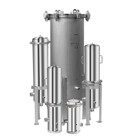Take a sidestream step for clean systems with Amazon

Amazon Filters is a leading manufacturer of permanent side stream filtration systems for initial clean-up and ongoing maintenance of closed loop water supplies to large buildings, and sectors such as airports, rail infrastructure, and sporting or entertainment arena.
BSRIA publication BG29/20/12 (Pre-commission Cleaning of Pipework Systems) recommends a permanent side stream filtration system as a key resource for initial clean-up and ongoing maintenance of water pipework systems.
Once installed, the side stream filtration system removes the contaminants from closed loop water systems – not only suspended solids but also the chemically treated biomass – and the problems that go with them. If left within the system these contaminants lead to poor temperature control within the building, greater maintenance issues and unsatisfied building users.
An Amazon Filters side stream filtration system is typically installed in the plant room. A system consists of an industrial-style filter housing and SupaSpun II depth cartridge filters - one of the few products to be accredited by the UK water industry for use in this specific type of application. Each side stream filtration system is designed to treat 5% to 15% of the mains water circuit flow in a closed loop water circuit.








